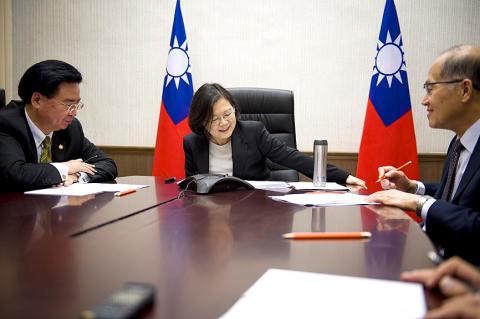President Tsai Ing-wen (蔡英文) and US president-elect Donald Trump spoke over the telephone on issues relating to improving the economy and strengthening national defense, the Presidential Office said yesterday.
The conversation, which the Presidential Office said took place at 11pm on Friday and lasted slightly longer than 10 minutes, was the first publicly reported call between a US president or a president-elect and a Taiwanese leader since 1979, when Washington switched diplomatic recognition from Taipei to Beijing.
Tsai congratulated Trump on his victory in the closely contested US presidential election and said she believed he would make an excellent president, the Presidential Office said in a news release, which added that Tsai also conveyed to Trump the hope that the US would support Taiwan making more contributions to and having more participation in international issues.

Photo provided by the Presidential Office
National Security Council Secretary-General Joseph Wu (吳釗燮), Minister of Foreign Affairs David Lee (李大維) and two other presidential aides were present during the conversation, the news release said.
Tsai and Trump talked about their views and ideals on governance, especially on promoting domestic economic development and strengthening national defense to ensure a better, safer life for the public, it said.
The two leaders also briefly exchanged views on the situation in Asia, it added.
On Taiwan-US relations, Tsai expressed the hope of boosting bilateral exchanges and contacts and establishing closer cooperation, it said.
Presidential Office spokesman Alex Huang (黃重諺) confirmed that it was Tsai who made the call to Trump following a pre-arranged procedure.
While he declined to give other details about the arrangement, a source familiar with the matter said that Edwin Feulner, founder of the Washington-based Heritage Foundation, played a key role in setting up the call.
Feulner, in Taipei in October, joined the Trump team in August, according to US media reports.
Trump also took to Twitter about the call.
The US president-elect tweeted: “The President of Taiwan CALLED ME today to wish me congratulations on winning the Presidency. Thank you!”
The traditional US diplomatic formulation for referring to Taiwan’s leader is “the president on Taiwan.”
In a second tweet Trump wrote: “Interesting how the U.S. sells Taiwan billions of dollars of military equipment but I should not accept a congratulatory call.”
US President Barack Obama’s White House said the outgoing US administration had not changed its stance.
“There is no change to our longstanding policy on cross-strait issues,” US National Security Council spokeswoman Emily Horne said.
“We remain firmly committed to our ‘One China’ policy,” she added. “Our fundamental interest is in peaceful and stable cross-strait relations.”
Additional reporting by AFP and The Guardian

AGING: As of last month, people aged 65 or older accounted for 20.06 percent of the total population and the number of couples who got married fell by 18,685 from 2024 Taiwan has surpassed South Korea as the country least willing to have children, with an annual crude birthrate of 4.62 per 1,000 people, Ministry of the Interior data showed yesterday. The nation was previously ranked the second-lowest country in terms of total fertility rate, or the average number of children a woman has in her lifetime. However, South Korea’s fertility rate began to recover from 2023, with total fertility rate rising from 0.72 and estimated to reach 0.82 to 0.85 by last year, and the crude birthrate projected at 6.7 per 1,000 people. Japan’s crude birthrate was projected to fall below six,

US President Donald Trump in an interview with the New York Times published on Thursday said that “it’s up to” Chinese President Xi Jinping (習近平) what China does on Taiwan, but that he would be “very unhappy” with a change in the “status quo.” “He [Xi] considers it to be a part of China, and that’s up to him what he’s going to be doing, but I’ve expressed to him that I would be very unhappy if he did that, and I don’t think he’ll do that. I hope he doesn’t do that,” Trump said. Trump made the comments in the context

SELF-DEFENSE: Tokyo has accelerated its spending goal and its defense minister said the nation needs to discuss whether it should develop nuclear-powered submarines China is ramping up objections to what it sees as Japan’s desire to acquire nuclear weapons, despite Tokyo’s longstanding renunciation of such arms, deepening another fissure in the two neighbors’ increasingly tense ties. In what appears to be a concerted effort, China’s foreign and defense ministries issued statements on Thursday condemning alleged remilitarism efforts by Tokyo. The remarks came as two of the country’s top think tanks jointly issued a 29-page report framing actions by “right-wing forces” in Japan as posing a “serious threat” to world peace. While that report did not define “right-wing forces,” the Chinese Ministry of Foreign Affairs was

PREPAREDNESS: Given the difficulty of importing ammunition during wartime, the Ministry of National Defense said it would prioritize ‘coproduction’ partnerships A newly formed unit of the Marine Corps tasked with land-based security operations has recently replaced its aging, domestically produced rifles with more advanced, US-made M4A1 rifles, a source said yesterday. The unnamed source familiar with the matter said the First Security Battalion of the Marine Corps’ Air Defense and Base Guard Group has replaced its older T65K2 rifles, which have been in service since the late 1980s, with the newly received M4A1s. The source did not say exactly when the upgrade took place or how many M4A1s were issued to the battalion. The confirmation came after Chinese-language media reported